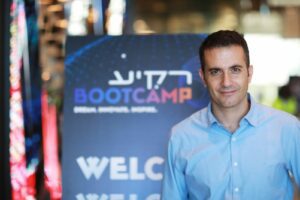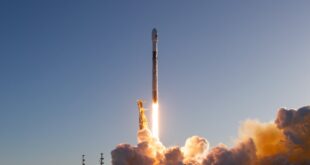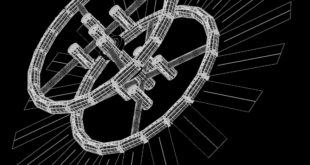By Luisa Low

During this week’s Space Café, SpaceWatch.Global Publisher Torsten Kriening spoke with Ran Livne, the Director-General of the Israel-based Ramon Foundation. In 2015, the organisation became the world’s first nonprofit to pilot and manage a human-crewed space mission.
Founded in 2010, Tel Aviv-based organisation provides education; support, awareness and inspiration to school-aged children across the country. The foundation promotes space and aviation with the aim of encouraging personal excellence and community involvement and supports academic achievement among school-aged Israelis.
As a graduate of the International Space University, Livne is passionate about innovation, space and aviation. Prior to joining as Director-General, Ran was Head of Business at strategic consulting firm TARA, head of the student body at Tel Aviv University, and previously consulted leading public bodies, including higher education, hospitals and nonprofits.
Having worked for an Israel-based high tech company, Torsten has long been impressed by the country’s innovation rate and the startup spirit. This week, he and Livne discuss Israel as an innovating nation, and
Punching above its weight – Israel as a leader in innovation
With a population of 8 million and without an oil or natural gas reserve, Israel had to ‘wrack its brains’ to develop its industrial output and prosperity. Since the 1990s it has long put great import on innovation and entrepreneurship in the space domain.
The small Eastern Mediterranean country has been ranked as world number one for startups per capita, boasting a large number of tech and space businesses – 50 or 60 according to Ran, who says this is thanks to the government investing heavily in the whole gamut of space operations, from manufacturing through to small satellites.
So where does The Ramon Foundation fit in?
The not-for-profit was founded by Rona Ramon, in recognition of her late husband Ilan Ramon – Israel’s first astronaut and fighter pilot who died tragically in the failed re-entry of the Space Shuttle Columbia in 2003. Having served both Israel and NASA, he remains the only foreign recipient of the US Congressional Space Medal of Honour.
Conceived in collaboration with the Ministry of Science, Rona dedicated the memory of her husband to education, building the foundation from 2008. Tragically, a year later her son Ashraf Ramon, a combat pilot, was killed in a flight training accident.
Now, the Foundation’s overarching role is to facilitate collaborations between different organisations, academics, the business and government sectors, as well as market education around space. With so many multinationals doing business in Israel, there are plenty of ‘in-kind’ opportunities startups can access even before obtaining seed funding.
In effect, the organisation lobbies for the space sector and connects the dots: “You can’t do space in a vacuum: you need to generate an ecosystem.”
Israel’s second space shot
Within just over a month, Israel will embark on its Rakia Mission, sending former fighter pilot, Ramon Foundation co-founder and soon-to-be astronaut, Eytan Stibbe on a historic mission to the International Space Station.
Described as an opportunity to augment Israeli technologies and scientific experiments in space – as well as to advance education and even the arts – the mission is headed by the Ramon Foundation in conjunction with the Israel Space Agency in the Ministry of Science and Technology. It is also part of Ax-1, which is part of the world’s first commercial space station, Axiom Space.
According to Ran, the mission isn’t yet another dime-a-dozen billionaire vanity trip designed to raise revenue and “look over here” PR value, but has been orchestrated as an ‘impact investment’ – a way to generate societal and scientific value for Israel.
“As part of the contract with Axiom, we are basically overseeing Eytan’s agenda of technology and science education on the ISS… and this is kind of a new model for managing space mission, because what the mission is all about, it’s about co-creating the space mission.”
The mission will help supercharge novel startups working in the space area, including companies and researchers developing truly innovative ways to support the hundred-odd people who are expected to live in space in the future.
“We’re going to have probably hundreds of people in orbit in 20 or 30 years from now – what are the key challenges? There are new challenges in… environmental control and life support systems, water purification, air scrubbing, generating energy. How are you going to provide these guys with quality medicine? At the end of the day, that won’t be probably hospitals in space.”
“We met around more than 1000 Israeli startups, which is quite a lot. And at the end of the day, we chose – out of dozens – more around 100 applicants and 44 different technologies that we want to be part of this.”
To listen to Ran Livne’s insights into Israel’s space sector, you can watch the full program here
Luisa Low is a freelance journalist and media adviser from Sydney, Australia. She currently manages Media and Public Relations for the University of Sydney’s Faculty of Engineering.
 SpaceWatch.Global An independent perspective on space
SpaceWatch.Global An independent perspective on space




